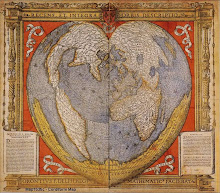To wit: "The mind is its own place and in itself/Can make a Heaven of hell, a hell of Heaven"
The footnotes for this section have a lot to say about how Satan's "heretical" talk here can be traced to Amaury de Bene of the 13th century and the Stoics and the idea that heaven and hell are states of mind rather than places. But it's also interesting, as the footnotes note, that within this you can see the idea that heaven and hell exist within one's own self. It's interesting that this vaguely heretical idea can exist within the scope of legitimate theological paradigms.
In Book IV Satan says "Which way I fly is hell;myself am hell" (Line 75). This first stood out to me because Robert Lowell cribbed it for Skunk Hour, which I knew before, but had never read the line in its' surrounding context.
The Lowell line in context: "A car radio bleats, "Love, O careless Love...." I hear/my ill-spirit sob in each blood cell,/as if my hand were at its throat..../I myself am hell;/nobody's here–"
In Lowell's poem, the speaker is not in hell, merely a declining Maine sea town. But like Satan, the speaker is in a torment of his own minds making. Only in this case, the depression of Lowell's speaker, unlike Satan, is a jarring but important insertion into the ordinary flow of the poem. It isn't what the poem is about, but it is what the poem becomes about, which is what makes it important. The torment of Satan is complicated: within the same group of lines where he proclaims himself a hell, he laments the lack of room for repentance or pardon, a dread of shame and an opening, lower deep which we never really see or hear explained. Satan's anomie and depression seem understandable here, indeed even sympathetic, like Lowell's narrator, but his characterization, as it unfolds throughout the rest of the books, seems to paint him as a decidedly unsympathetic character, one who wants to destroy innocence.

1 comment:
when i read alessandro scafi's MAPPING EDEN, i kept thinking about humanity's need to geographically position perfection, whether it be Eden/Paradise or Heaven, Shangri-La or Valhalla. Each culture, with their own unique and specific ideas of creation, and having their unique and specific concepts of perfection or heaven, seems to share the need for the ideal of perfection, and of Heaven.
We saw mention of 'perfect' places in the narratives from Cortes and Bernal when they spoke of the indigenous people's creation myths, el dorado, etc. We read about the placing of Eden in relation to the four rivers,
with four rivers flowing from Eden itself. Judeo-christian culture's definitive ideals that Genesis is talking about the Tigris and Euphrates rivers - with the locations of the Gihan and the Pison unclear/unknown, puts Eden within reach, and yet just beyond our grasp.
When David references Lowell's poem, and the speaker's location in Maine, but with Hell as his own mind's making, i paralleled it to the universality of Heaven/paradise also being the making and desire of the collective mind of humanity. People need to believe in perfection and a force greater then themselves- like Shangri La or like Eden, and it can be a force of one's own mind, as the "mind is its own place..." quote illustrates.
Also the duality of this perfection as being something beyond the reach of mankind(scafi, p-52)is intriguing to me. Scafi mentions the notion of connection and separation, that the Earthly Paradise is just beyond reach on an inaccessible mountain top (which made me think of Shangri La) or beyond an impassable ocean(like the waters travelled in the Odyssey). This is the separation, and yet it is somehow connected because the 4 rivers of Eden flow out to hydrate the world, and so they are connected to humanity and the earth in a very real way.
The Dream, the hope, the desire for perfection (the rivers of Eden) makes our world able to exist(the life giving flow of water).
And, you can take it a step further, if people need to believe in heaven -as a justification for doing good, for working hard for striving for a goal, then they also need to believe in Hell, as a means of control, as a justification to not do harm, etc. So, people create Hell in their own minds, whether they are Satan or a speaker in a sea town in Maine.
Post a Comment